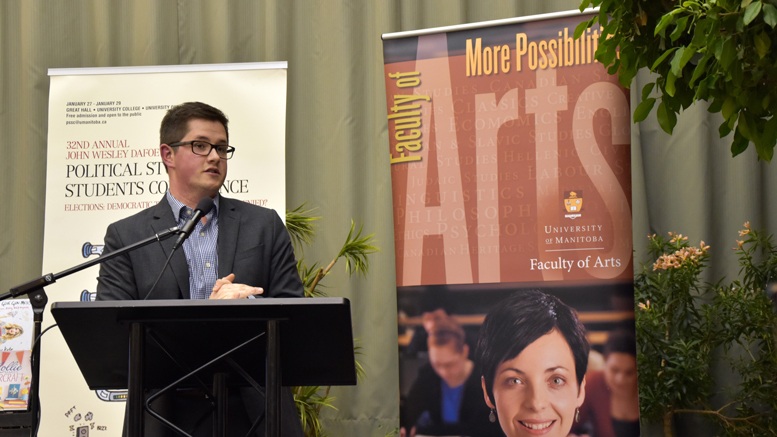Electoral politics went under the microscope at the University of Manitoba late last week when political studies students hosted the 32nd annual John Wesley Dafoe Conference.
Branded “Elections: Democratic Tools or Democracy Denied?,” the conference ran from Jan. 27 to 29 and examined electoral politics in the modern era through a handful of panels ranging from international elections to campaigns in the 21st century.
David Coletto, CEO of Canadian polling company Abacus Data, opened the conference Jan. 27 with a keynote address looking at “Canadian Public Opinion: what we know, where it’s going, and why it matters.”
From the perspective of public opinion and polling, he said, two campaigns were underway during the 2015 federal election. He said it is typical for campaigns to come down to the question of whether the incumbent government deserves re-election or a credible alternative is prepared to step in.
Coletto presented data he said demonstrated the failure of the Conservative party to frame the fall election in their favour, specifically around the economy.
Coletto said polls showed Canadians deemed the Tories most capable of managing the economy and 46 per cent of voters indicated that was the primary concern of the election. However, more than half saw the election as about something more and the incumbent government was unable to hold sway with those voters.
When asked about his stance on the effects of polls in a democracy, Coletto defended their viability.
“They indirectly affect voters because if a party falls in the polls, they may not get as much coverage in the media – so that’s where they have the biggest effect,” he told the Manitoban.
“I am a defender and an advocate for good polling,” he added, “because I think that good information makes for better decisions.”
Coletto also commented on the state of provincial politics in Manitoba, saying he sees the current struggles of the incumbent NDP government, along with Justin Trudeau’s sweeping win at the federal level, as an opportunity for the Manitoba Liberals. However, he said it’s not clear if that will translate into votes come election day.
The conference continued Jan. 28 on the Fort Garry campus with three panels looking at elections in the 21st century, public opinion polling, and participation and representation in elections. A roundtable discussing 100 years of women’s suffrage in Manitoba was also convened.
The final day’s panels looked at conducting elections on an international stage and future challenges for elections.
Examining campaigns in the 21st century, Laura Anthony, research manager with charitable research and educational organization Samara, said young voters, while active in between election cycles, become disengaged with formal politics during the campaign process.
“This is an election where we didn’t see political parties tap into the online, digital revolution,” said Anthony, adding that connections between parties and individuals have a direct impact on election turnout.
Royce Koop, associate professor and head of the department of political studies at the University of Manitoba, talked about the role of local campaigns during elections.
He acknowledged the importance of national campaigns but argued for a decentralized approach to campaign management in a country as diverse as Canada that would allow local campaigns a fair degree of autonomy.
Koop said he has walked the campaign trail with a number of politicians and stressed door-knocking as the “gold standard” for campaign tactics.
“There’s no such thing as a national campaign in Canada – there are 338 local ones – and these are the settings in which elections are won or lost,” he told the Manitoban.



